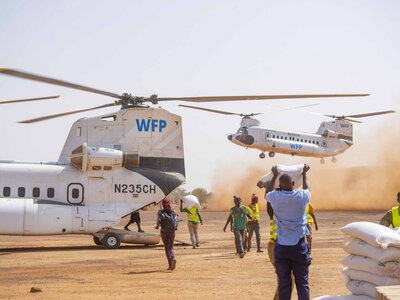Burkina Faso
- 2.7 million
- people suffer from acute hunger
- 2 million
- people displaced by conflict
- 40 percent
- of the population (9 million people) live below the national poverty line
Once enjoying peace and security, Burkina Faso’s population has seen its living conditions drastically deteriorate since 2019 due to the proliferation of armed groups. Located in Western Africa within the Sahel region, the country grapples with a multidimensional crisis driven by armed conflict, political instability, widespread poverty, and climate change. Over 40 percent of the population live below the national poverty line, while social protection coverage is limited. Women and girls are disproportionately affected, facing higher risks of hunger, malnutrition, gender-based violence, exploitation, and the denial of resources and opportunities.
The ongoing conflict has endangered people’s lives and livelihoods. Violence and insecurity have forced nearly 1,000 health facilities to close or reduce services to a minimum, while over 5,300 schools – comprising 20 percent of the country’s educational structures – have shut down. The displacement crisis, in recent years one of the fastest growing in the world, is also compounding the socioeconomic challenges in host communities, exacerbating competition over access to scarce resources such as land.
What the World Food Programme is doing in Burkina Faso
-
Crisis response
-
WFP provides emergency food and nutrition assistance to crisis-affected women, men and young children. Emergency response activities include general food distributions to acutely food-insecure people (including internally displaced persons, refugees and host communities).
-
School meals
-
As part of its school-based programmes, WFP provides on-site nutritious breakfasts and lunches to children in 1,000 schools, including those with large numbers of internally displaced children. Monthly, family take-home rations are provided to schoolgirls attending the last two years of their primary education, who reach the required attendance during the month. WFP also assists schools in transitioning to a home-grown school feeding model, where canteens are supplied with locally grown, nutritious and diversified food produced by smallholder farmers.
-
Nutrition
-
WFP implements nutrition programmes to address wasting (low weight for height), stunting (impaired development due to malnutrition) and micronutrient deficiencies. This includes specialized nutritious food to prevent and treat malnutrition among children aged 6-59 months, as well as pregnant and breastfeeding women and girls. WFP also promotes good nutrition and hygiene practices and supports mothers' groups in raising awareness about appropriate infant and young child feeding practices. Additionally, WFP aims to increase the availability and affordability of nutritious foods by supporting the local production of fortified infant flour.
-
Resilience building
-
WFP builds the resilience of vulnerable households and communities to better withstand shocks and stressors, such as the impact of the climate crisis. These initiatives involve people restoring degraded land, developing lowland for rice production, producing organic fertilizers and building reservoirs for irrigation and boreholes to extract groundwater. The assets created and restored contribute to reducing community tensions over natural resources, thereby fostering social cohesion. WFP assists smallholder farmers by providing training, agricultural inputs, tools and equipment to improve agricultural productivity, reduce post-harvest losses, address crop contamination, and facilitate access to markets and climate insurance.
-
Capacity strengthening
-
WFP has been strengthening the capacities of national institutions, particularly the National Council for Emergency Relief and Rehabilitation (CONASUR) and the National Food Security Stock Management Company (SONAGESS). This includes increasing storage capacities, providing laboratory equipment and conducting training on logistics, food handling, storage, pest control, food safety and quality assurance. Additionally, WFP provides technical support to the country’s social protection system, including the national social protection strategy, the national social protection programme, and the expansion of the single social registry.
-
Common services
-
WFP plays a crucial role in the broader humanitarian response through the WFP-managed United Nations Humanitarian Air Service, as well as the WFP-led Logistics Cluster and Information Technology Common Service sector.
Burkina Faso news releases
Go to pagePartners and Donors
Find out more about the state of food security in Burkina Faso
Visit the food security analysis pageOperations in Burkina Faso
Contacts
Office
66, Angle Av. Georges Konseiga et Av.du Général Aboubacar S. Lamizana, 11 BP 1754 Ouagadougou 11, Burkina Faso
Ouagadougou
Burkina Faso







